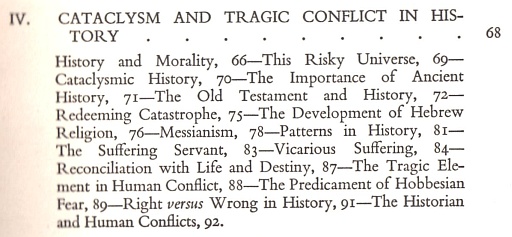
Butterfield's book (I have a copy with me, inscribed as a Christmas present in 1949 to a P G Halsey).
It has an Introduction, on 'The God of History', and seven chapters, listed with a contents summary, perhaps as written by Butterfield before he started. Chapter IV , with its summary, has been scanned in below.
I. HISTORICAL SCHOLARSHIP AND ITS RELATION TO LIFE | II. HUMAN NATURE IN HISTORY | III. JUDGMENT IN HISTORY | IV. CATACLYSM AND TRAGIC CONFLICT IN HISTORY | V. PROVIDENCE AND THE HISTORICAL ROCESS | VI CHRISTIANITY AS AN HISTORICAL RELIGION | VII HISTORY, RELIGION, AND THE PRESENT DAY
The book is unindexed, as might be expected of a script of a radio programme. Probably Butterfield expected it to be read in a properly awe-inspired and devout state of mind.
Butterfield seems to have annoyed Bertrand Russell, though his argument against Butterfield mostly attacked Christianity as not being true. Russell included a chapter in Human Society in Ethics and Politics (Will Religious Faith Cure Our Troubles?) which contains a longish account of the conventional history since 1914, which largely avoided Jews, and said it's independent of religious beliefs, meaning Jew-naive Christianity. Both these men have parallels now: Kevin MacDonald's Occidental Observer often has articles of similar types, infused with newer Jew fakery. Nobody ever seems to point out that belief in a completely invisible 'God' is yet another Jewish imposition.
Butterfield seems to me a good example of the hired person, accustomed to being paid for his work, marching along in blinders (or blinkers!
